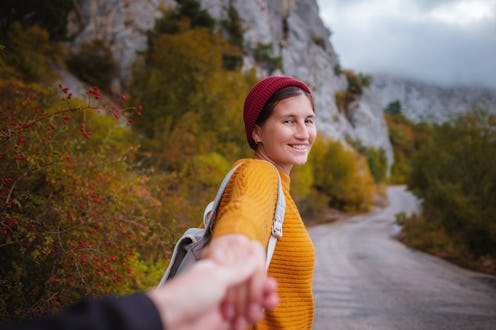Dating
It's Time To Think Differently About Your "Type"
Matchmaker Maria Avgitidis shares the questions you should be asking yourself.

Picture this: It’s the year 2021 and the hottest new pickup line is “I’m vaccinated.” People don laminated vaccination cards around their necks in crowded bars, a symbol of both their availability and perceived political stance, and hourslong video dates have become the new norm.
A year later, displaying your vax card has become less of a single-person’s calling card, but the dating scene remains dramatically altered. According to dating app Bumble, the pandemic has made almost half of its users (48%, to be exact) question what their “type” actually is. It’s a trend that extends to Hollywood, with unexpected couples like Kravis and Kete making their love Instagram official.
Dating outside your typical preferences can be uncomfortable at first, especially if you don’t know what you’re doing, but experts say seeing people outside your comfort zone might help you find exactly what you’re looking for. Plus, it’ll help you stop repeating the same pesky dating mistakes over and over.
For Maria Avgitidis (aka @matchmakermaria), a fourth-generation matchmaker and CEO of Agape Match, it's crucial to find her clients people with whom they're compatible “in [terms of] values, communication, and life goals.” “I have met over 10,000 people and set up over 4,500 first dates,” she tells Bustle. “I also help my clients, through coaching, understand what compatibility and chemistry mean.” Sometimes, she’ll help them “fix their picker,” so they’ll start choosing better partners.
So, how exactly does one go about doing that? Below, Matchmaker Maria discusses exactly what it means to have a “type” and how to adjust your dating habits to get what you want out of a relationship. (And, no, it doesn’t have to backfire like it did for Shake on Love Is Blind.)
What does it mean to have a type?
For a lot of people, a type is what someone is familiar with, be it in real life or virtual reality. For some, a type is molded from understanding what worked in their last relationships, but for most people, a type is what society nudges us to like (i.e., when people reply "tall, dark and handsome") or what our social media diets pump [out] for us on rotation (i.e., "model looks only, please"). When people tell me they are only attracted to XYZ type, I always ask how that's worked for them. How do you meet people within this type? Have you ever dated a nontype? How did you feel then? Why is that your type? How much have you thought about your type?
How can we change our thinking about this?
If you want to have kids, what's the type of partner you want to raise a kid with? Describe them to me. That’s your new type. (Notice how that type doesn't have a particular height restriction?) If you want a healthy long-term relationship, how would you feel in that relationship? What kind of temperament keeps you calm, supported, and acknowledged? That's a new type.
Prior to the pandemic, [most] couples subscribed to a relationship design that involved sleeping for one-third of the day, being "at work" one-third of the day, and spending time together for one-third [of the day]. Then they had weekends together, but may have also attended events or done errands alone. And then the pandemic forced most of us home... together... all the time.
Sh*t will hit the fan. That's life.
At some point, our parents will get sick and die. We might lose our jobs. Our kids could get sick. A global pandemic could happen. When we look at the "when sh*t hits the fan" lens, I ask you, what kind of person do you want next to you then? That should be your type.
What are some other qualities people should look for in a potential match aside from “types”?
Strong relationships heavily depend on shared values. Learning what those values are and articulating them is a recipe for relationship success.
How can someone abandon their type without it failing, like it did for Shake on Love Is Blind?
Of course, attraction is in the eye of the beholder. I have met men who say they are attracted to a really, really specific type, and I have met men who cast very wide ranges because they are attracted to more "types" of women. I think Shake could have been vetted for a better show — not one about blind dating.
This interview has been edited and condensed for clarity.
This article was originally published on